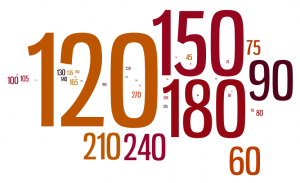How long is the average viva?
Top of my list of questions, I wanted to know how long vivas were. I added up all of the lengths and divided by the number of participants and arrived at 2 hours and 23 minutes.
So now we know.
Except…
That’s not very helpful is it? We need to know how that relates to the various lengths reported. Is this skewed by one person with a twelve hour viva? (thankfully no!) This average gives us a smile I think, but not much more. So let’s look closer:

This image shows times concentrated around a range from 120 to 180 minutes. In fact, in my data:
- 82.1% of respondents reported a viva of three hours or less, and almost 50% had a viva of two hours of less.
- Less than 5% had a viva of more than four hours.
- The most commonly reported time was 2 hours.
This is good news – and I think does a lot to debunk urban legends that get circulated. This data was collected from respondents who had their viva between 1999 and 2014, but almost two thirds of the responses were from 2010/14; when the set is restricted to responses from this period the results hold more or less true, with only a slight increase in longer vivas.
What sort of pass do graduates get?
Before asking questions for this survey, the oft-repeated wisdom about viva results said that around 80% of graduates got minor corrections or no corrections, and that nearly everyone else got major corrections (which have different definitions depending on institutions).
The results of the survey say something different:
- 84% of candidates get minor corrections;
- over 9% of candidates get no corrections at all;
- less than 7% of candidates get major corrections.
This is GOOD news. This means that over 90% of candidates are broadly achieving the standard required for their thesis – they do not need substantial changes after submission. This is great news. If PhD candidates are generally meeting the thesis and research standards required, then news of that can help nervous candidates; it also reinforces the conviction that doctoral training is having an impact – whether that comes from supervisors, researcher developers or peer groups.
When are results given?
Nearly every PhD graduate I have spoken to has told me that they found out their results at the end of the viva (typically after a short break). And every researcher developer and Graduate School staff member I have spoken to over the last four years has told me that a candidate would “normally” find out that they have passed at the end. The outliers are people who are told possibly to put them at ease, or maybe by examiners who want to get formalities out of the way.
However, the survey showed that while the majority of candidates are told at the end of the viva, 20.9% are told at the start that they have passed! Who are all of these people? More importantly, what were their theses like?
To the latter question I have no answer, but tomorrow I will shine some light on the former. While all of these results that I have shared today are accurate – in as much as that is what the data shows us – they are skewed by another factor. Tomorrow I will re-examine these results, and show the clear distinction between the Arts, Social Sciences and Humanities and the Sciences.
Thanks for reading – questions and comments below please, I will do my best to respond!
Nathan (@DrRyder and @VivaSurvivors)

4 replies on “Viva Experience Research, Part 2: Some Statistics”
[…] yesterday’s post I shared some results from my survey […]
[…] For the thesis itself, the added bonus is that they have had practice in academic writing: a thesis is not identical to a paper, but everything helps. If they have received corrections via peer review then they will have an idea of what to expect from corrections from their examiners too (minor corrections are likely). […]
[…] and also one of the most interesting. The quantitative answers that I found – explored in Tuesday’s and Wednesday’s posts – were interesting, and I think have a lot to offer people who […]
[…] this year, a series of seven questions I asked PhD graduates about their viva experiences. On Tuesday and Wednesday I shared the basic quantitative results that I have found through analysing the […]